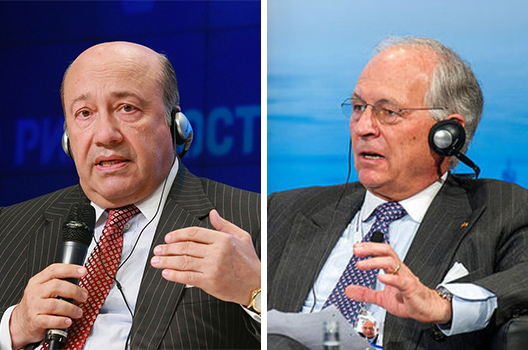 Four months into the Russia-Ukraine crisis, public discourse between Russia and the transatlantic West is not just polarized, it’s even toxic. Last month, when Ukraine and Romania barred Russian Deputy Prime Minister Dmitriy Rogozin’s jet from their airspace, he tweeted that he would visit those countries next time in a strategic bomber. Last week, Ukrainian Foreign Minister Andriy Deshchystya took to public name-calling, labeling Russia’s President Vladimir Putin with a vulgarity.
Four months into the Russia-Ukraine crisis, public discourse between Russia and the transatlantic West is not just polarized, it’s even toxic. Last month, when Ukraine and Romania barred Russian Deputy Prime Minister Dmitriy Rogozin’s jet from their airspace, he tweeted that he would visit those countries next time in a strategic bomber. Last week, Ukrainian Foreign Minister Andriy Deshchystya took to public name-calling, labeling Russia’s President Vladimir Putin with a vulgarity.
Amid this antagonism, two senior diplomats, Russia’s Ivanov and Germany’s Ischinger, offer a possible start to dialogue. The exchange began last month as Ischinger was traveling in Ukraine as an envoy of the Organization for Security and Cooperation in Europe, promoting national dialogue. On May 21, Ivanov published “eight lessons” on the Ukraine crisis. In his current role as president of the Russian International Affairs Council, the state’s premier think tank on foreign affairs, Ivanov is the most authoritative Russian voice possible in any track-two dialogue.
Ivanov’s essay underscores how very elemental any dialogue now must be, given the loss of trust in Russia-West relations. Effectively, he makes the case simply that “we’ve got to talk.”
Ivanov argues that “the crisis must not be allowed to spin out of control,” and that “political contacts between Russia and the West must not be put on ice.” In a reminder of how badly the recent months have slashed the fabric of international relations, he writes that a “universal understanding of international law must be restored.” Ivanov blames years of actions by the West for “undermining the foundations of international law,” and writes that growing conflict between Russia and the West have bred political radicalism on both sides.
Ischinger, responding today on the Atlantic Council website, is concise in reply. Fundamentally, “the problem is that a colossal loss of trust has occurred, and that is difficult to repair,” he writes.
Where Ischinger finds Ivanov criticizing the West and ignoring Russian contributions to the conflict (most importantly its seizure of Crimea), he says so. Where Ivanov repeats Moscow’s assertion that Ukraine’s new government is dominateed by radical nationalists, Ischinger dismisses this concoction as “simply a myth,” pointing out that nationalist parties won less than 5 percent of the votes in last months presidential election. Ischinger’s quickness to brush aside the political fictions within Russia’s argument is significant coming from a German leader, suggests Atlantic Council Senior Fellow Ian Brzezinski. Germany’s government has “been a significant impediment to a more forceful Western response to Putin’s invasion of Ukraine,” he says.
So what does this exchange mean?
Neither writer suggests any concrete first step in pursuing a dialogue, although perhaps one can be inferred from Ischinger’s offering. “I was not in favor,” he writes, of the western nations’ decision to exclude Russia from this month’s planned summit conference of the Group of Eight industrialized nations. Rather than booting Putin from the room and meeting as the Group of Seven, Ischinger suggests that it might have been better to offer Putin a place at the table with the caveat that the only issue the group wanted to discuss was “Crimea and Ukraine.”
With that, a question that hangs in the air at the end of the Ivanov-Ischinger exchange is whether such a Group of Eight meeting might yet offer a start to dialogue.
James Rupert is an editor at the Atlantic Council.
Image: Former Russian Foreign Minister Igor Ivanov, left, and former German Deputy Foreign Minister Wolfgang Ischinger, right. (CC: Russian International Affairs Council; Wikimedia)
